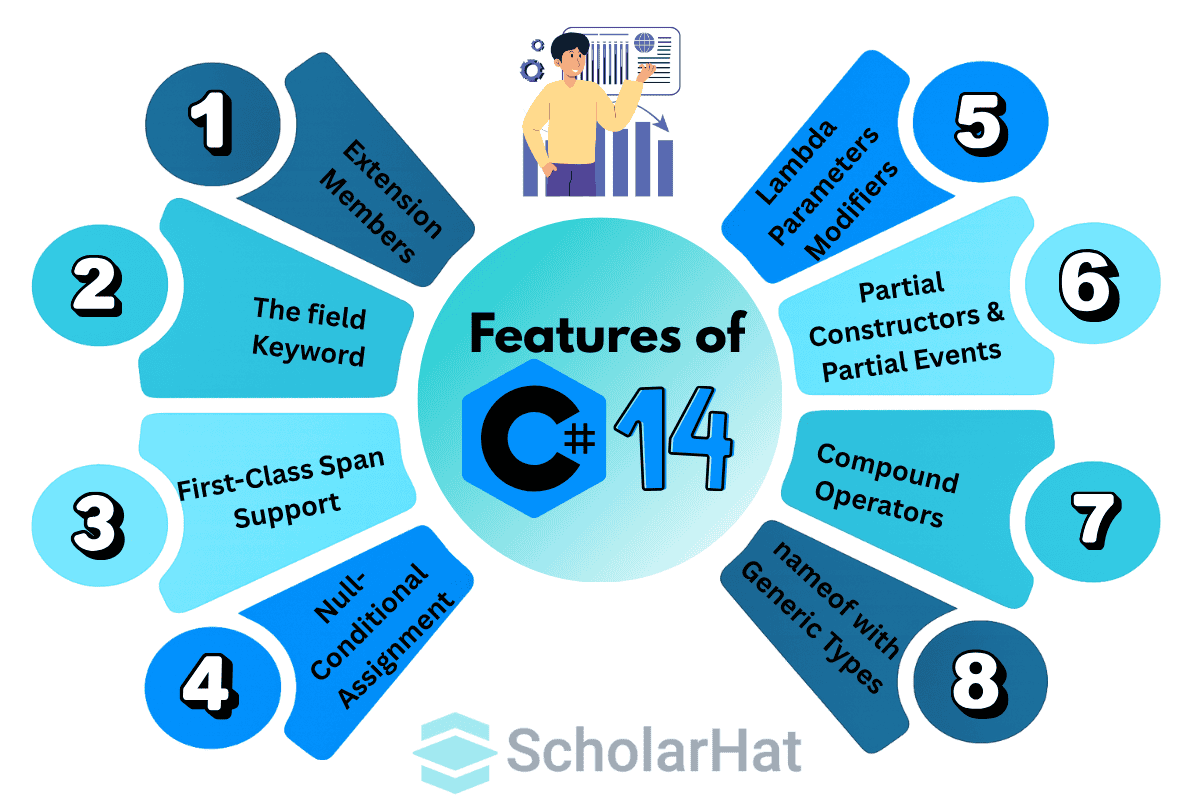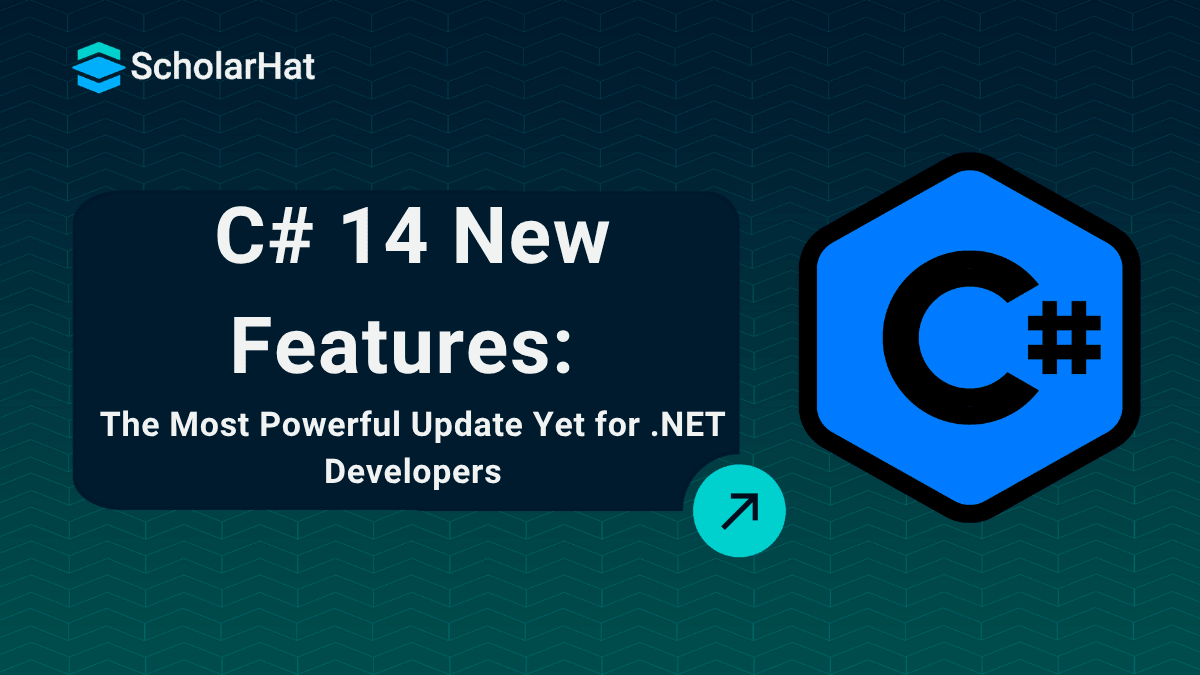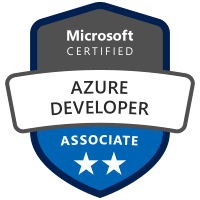27
FebC# 14 New Features: The Most Powerful Update Yet for .NET Developers
C# 14 is the latest version of Microsoft’s C# language, bringing cleaner syntax, better performance, and smarter features that reduce boilerplate and make coding easier. It focuses on making everyday development faster and more intuitive for beginners and professionals alike.
In this C# tutorial, you’ll quickly understand what C# 14 is, why it matters, how it improves on older versions, and the major features that make it a strong upgrade for modern .NET development. Unlock high-paying roles in game development and enterprise software with C# expertise, valued by 80% of tech employers. Enroll in our Free C# Certification Course now!
Introduction to C# 14
C# 14 is the next major version of Microsoft's C# programming language, planned as part of the upcoming .NET ecosystem updates. It focuses on making C# cleaner, faster, and more expressive while reducing boilerplate code. The goal of C# 14 is to improve developer productivity, simplify complex patterns, and bring modern coding conveniences to everyday .NET development.
This version introduces several high-impact language features such as Extension Members, the field keyword for automatic backing fields, advanced Span support, new null-safe assignment operators, and more flexible lambda expressions. It’s designed to help developers write shorter, smarter, and more maintainable code without sacrificing performance or safety.
Why C# 14 Matters?
C# 14 matters because it represents a major shift toward cleaner, faster, and more expressive coding.
- It reduces boilerplate, making the language lighter and cleaner.
- It boosts performance with first-class Span and zero-allocation operations.
- It fixes long-standing syntax limitations developers struggled with.
- It improves code readability and maintainability across large systems.
- It enables more functional, modern, and expressive coding patterns
- It keeps C# evolving to meet modern programming needs
C# 14 vs Older Versions: Feature Comparison
| Feature | C# 14 | C#: Older Versions |
| Extension Members (Methods, Properties, Operators) | Fully supports extending types with fields, properties, operators, and type-level behavior. | Only extension methods were allowed; no properties or operators. |
| field Keyword | Automatically generates backing fields with cleaner syntax. | Developers had to manually create private backing fields. |
| First-Class Span Support | Built-in implicit conversions and better performance for memory-safe operations. | Limited support requiring explicit conversions and boilerplate. |
| Null-Conditional Assignment (?.=) & Index (?[]=) | Safely assign values only when the target is not null. | Required long null-check patterns. |
| Lambda Parameters with Modifiers | Allows ref, out, scoped modifiers directly in lambdas. | Modifiers not allowed in lambda parameters. |
| Partial Constructors & Partial Events | Enables splitting constructors and events across files. | Only classes, methods, and properties were partial. |
| User-Defined Compound Assignment Operators (+=, -=, etc.) | Custom compound operators can be defined for your types. | Only built-in compound operators; no customization. |
| nameof with Open Generic Types | Can use nameof(T) even when the generic type isn’t bound. | Only worked with concrete or closed constructed types. |
All Major Features of C# 14
C# 14 brings several important improvements that make the language cleaner, faster, and easier to use. Here are the key features you should know.

1. Extension Members (Properties, Operators & Type-Level Extensions)
Key Highlights:
- Add custom properties to existing types
- Add operators like +, -, == without touching original type
- Extend types at compile time with no runtime cost
- Great for clean architecture & domain-driven design
- Eliminates bulky utility/helper classes
public static extension class StringExtensions
{
public static int WordCount(this string text) => text.Split(' ').Length;
public static string UpperFirst(this string text)
=> char.ToUpper(text[0]) + text.Substring(1);
public static string operator +(string s, int times)
=> string.Concat(Enumerable.Repeat(s, times));
}
Console.WriteLine("hello".WordCount()); // 1
Console.WriteLine("hello".UpperFirst()); // Hello
Console.WriteLine("hi" + 3); // hihihi2. The field Keyword
Key Highlights:
- Removes 90% of backing-field boilerplate
- Improves readability of property logic
- No need to maintain private fields manually
- Avoids bugs due to mismatched field/property
- Cleaner class definitions
public class User
{
public string Name
{
get => field;
set => field = value.Trim();
}
}
3. First-Class Span Support & Implicit Conversions
Key Highlights:
- Smoother memory-safe operations
- Automatic conversions from arrays, strings, and lists
- Faster parsers and high-performance APIs
- Zero-allocation design makes apps faster
- Ideal for game dev, cloud, and low-level tasks
Span chars = "hello"; // implicit conversion
chars[0] = 'H';
Console.WriteLine(chars.ToString()); // Hello
4. Null-Conditional Assignment (?.= and ?[]=)
Key Highlights:
- Avoids NullReferenceExceptions
- No need for explicit if (x != null) checks
- Cleaner code when updating nested objects
- Supports both property and index access
- Ideal for large data models
Code Example:
User? user = GetUser();
user?.Address?.City ?.= "Mumbai";
user?.Tags?["role"] ?= "admin";
User? user = GetUser();
user?.Address?.City ?.= "Mumbai";
user?.Tags?["role"] ?= "admin";
5. Lambda Parameters with Modifiers (ref, out, scoped)
Key Highlights:
- Supports low-level memory manipulation in lambdas
- Enables advanced functional scenarios
- Eliminates wrapper methods
- Improves expressiveness for high-performance code
- Works seamlessly with Span
var scale = (ref int x, int amount) => x *= amount;
int value = 10;
scale(ref value, 5);
Console.WriteLine(value); // 50
6. More Partial Members: Partial Constructors & Events
- Break large constructors into multiple files
- Combine logic from codegen + manual code
- Partial events improve modularity
- Great for Blazor, EF, and Source Generators
- Cleaner separation of logic
public partial class Product
{
partial void OnInit();
public Product()
{
OnInit();
}
}
public partial class Product
{
partial void OnInit()
{
Console.WriteLine("Product initialized!");
}
}
7. User-Defined Compound Assignment Operators (+=, -=)
Key Highlights:
- Full support for +=, -=, *=, /=, %=
- Better domain models (Money, Units, Distance, Score, etc.)
- Cleaner and more natural syntax
- Replaces verbose methods like AddValue()
- Zero extra runtime cost
- Makes custom types feel like built-in types
- Useful for physics engines, economics models, scoring systems
public struct Score
{
public int Value;
public static Score operator +(Score s, int v)
=> new Score { Value = s.Value + v };
public static Score operator +=(Score s, int v)
=> s + v;
}
var s = new Score();
s += 100;
s += 50;
Console.WriteLine(s.Value); // 150
8. nameof with Unbound (Open) Generic Types
Key Highlights:
- Cleaner reflection and metadata code
- No need to specify generic type parameters
- Helpful for logging, diagnostics, analyzers
- Reduces verbosity
- Works with any generic type
Console.WriteLine(nameof(Dictionary<,>));
Console.WriteLine(nameof(Task<>));
Console.WriteLine(nameof(List<>));
Conclusion
FAQs
Take our Csharp skill challenge to evaluate yourself!

In less than 5 minutes, with our skill challenge, you can identify your knowledge gaps and strengths in a given skill.











